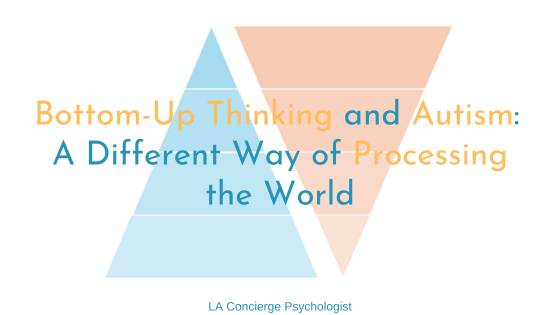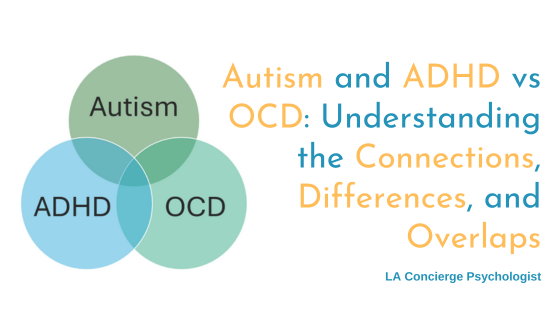As adult autism specialists, we are often asked how to be successful with autism. Typically, our clients want to know what jobs are good for adults with so-called “high-functioning” autism. (Learn about why we don’t use functioning labels) We agree that it’s essential to explore career pathways that play to a person’s strengths. However, it is equally vital to their career success—if not more important—to find the right employer.
This blog post explains how to find both. If you are an autistic adult looking for autism career advice, the information below can help you narrow down your list of careers/jobs and companies that will work with your autism.
Part 1: Finding the right career
As you read the tips below, keep in mind that autism career development is a reiterative process. As your priorities and interests evolve over the years, your career may need to evolve, as well. The following autism career advice applies whether you’re just starting out in the working world or you’re considering a career change later in life.
Review your strengths and interests
The best potential autism career pathways for you will depend on your strengths and interests. Are you visually-oriented? A career as a graphic designer, illustrator, or architect might be good for you. Are you detail-oriented? You might consider work in programming, engineering, quality control, accounting, or billing. Do you like to put things together? Maybe you’d be interested in a career as a machinist, baker, woodworker, or welder. Jot down all of your ideas onto a single list.
Which activities do you enjoy? What are you good at? How would you like to spend your time in the future? Use this information to inspire career ideas. Be sure to include your dream job as you make your list of potential careers, but keep in mind that many dream jobs are hard to get, either because they are not in high demand or highly competitive. As a backup plan, we recommend you include career options that may be less interesting but still related to your dream job.
For example, perhaps your dream job would be to work at Disneyland as a costumed character. You would write down “costumed Disneyland character” on your list, but we would also recommend you include backup ideas like working at the Disney store at your local mall. Another related idea would be to open a local business where you visit children’s parties in costume.
Don’t rule out anything at this point in the process. Keep potential careers on your list even if you’re not sure about them. It’s also essential that you don’t let anyone discourage you from considering a career they think you are incapable of. You have the right and responsibility to direct your own life, and no one understands your strengths and interests like you do. That said, it is also important to. . .
Consider your needs and sensitivities
There are many good jobs available for autistic adults. You can find lists of careers that work best with autism on the internet, but keep in mind that everyone is different. A career that works for one autistic person won’t necessarily work for another. To find the right field for you, think about your needs and preferences and jot them down.
Think about situations that make you uncomfortable or unhappy and consider why. For example, if you get upset when someone makes a sudden change to your schedule, you have a preference or need for consistency and predictability. If so, you might write down “structured, predictable workday” on your list of career preferences.
Do you prefer a quiet working environment due to sensory sensitivities? Do you need freedom and an independent work environment due to social anxiety? If you’re not sure what your needs are, it can help to ask a trusted friend or autism therapist. You could also look up lists of autism traits online to see if any of them sound familiar to you.
Don’t forget to include your needs and preferences that are unrelated to autism. For example, perhaps one of your life goals is to own a large home someday. Depending on average home prices in your area, you might write down “at least 50K per year salary” on your list of needs.
Eliminate career ideas that don’t meet your needs
The next step is to compare your needs and sensitivities against your list of potential careers. The goal of this step is to eliminate bad matches so that only the highest-potential career ideas remain.
For example, perhaps you are a very visual person, and you’re interested in aesthetics, so you added “make-up artist” to your list of potential careers. However, when you consider your list of needs, you realize that you have unsteady hands and dislike the feeling of being too close to people’s faces. If so, being a make-up artist might not work out. Consider whether other related careers might work better and add them to your list.
Here’s another example: You love animals, so you have “dog groomer” on your list of potential careers. You also included “quiet working environment” on your list of needs since you are sensitive to noise. Comparing the two, you realize that the sound of dozens of barking dogs might be overstimulating. If so, a career as a veterinarian, dog trainer, or dog walker might be a better fit.
Sometimes you won’t realize that a particular career is a bad match until you try it. We recommend conducting small tests to avoid investing a lot of time and money on something that might not work out. You could conduct an informational interview with someone in that career or job shadow them for a day. You could take a community college class or visit a trade school before signing up for a four-year college degree. You could also try an entry-level internship or temp position to see how things go.
Part 2: Finding the right employer
Even if you manage to find a job in your dream field, you might end up being unhappy if you work for an employer that doesn’t accommodate neurodiversity. Here’s how to increase your chances of finding the right workplace environment at each stage of the job search process:
Pre-interview
Do a bit of research before you apply for each job. Look up company reviews on websites like Glassdoor.com to see how people describe the workplace environment. Remember that disgruntled employees might paint an overly negative picture, so it’s important to take individual reviews with a grain of salt. At the same time, you should pay attention if multiple bad reviews are saying similar things.
You can also find welcoming workplace environments by looking for companies that are actively recruiting autistic people. Many software companies, accounting firms, retail chains, and manufacturing companies recognize the value of diverse hiring and have autism outreach programs. Search for neurodiversity-focused hiring programs near you to see what might be available.
Interview
Pay attention during the interview process to get a feel for how well you might mesh with a company’s culture. Ask questions about the work environment and how managers support employees’ needs. If they seem annoyed or surprised by your questions, they might not be a very empathetic workplace. You can also request to meet your future colleagues to find out more about the workplace environment.
The question of whether to disclose your autism to an employer is a personal one. If you do decide to share this information, you can ask about your target company’s willingness to offer specific accommodations you will need. If you’re going to bring up your autism, we recommend you do it late in the interview process or after they’re already made you an offer. And be polite. If you start making demands during the first phone call, they might decide hiring you would be too much trouble.
Post-hire
Experience is the greatest teacher. The first few months you spend working at a new company will tell you a lot about its long-term potential.
If you encounter difficulties, don’t make any rash decisions. First, ask yourself whether there is anything you could do to improve the situation. For example, you might be frustrated by your company’s no-headphone policy if you need noise-canceling headphones to concentrate on your work. Before you throw up your hands and quit, consider whether your boss might be able to make a policy change or whether you could request accommodation. Click here to learn more about advocating for yourself at work.
In some cases, the problems you experience won’t be fixable through any action on your part. Assuming you think it over carefully and make your decision while feeling calm, there is nothing wrong with quitting a job that is a bad fit.
Helping Autistic Adults Thrive
If the process above sounds overwhelming, we can help support you throughout your career journey. It can be difficult finding the right career and employer, and you may be tempted to give up at certain points. Having a supportive person can help you persist, even when times feel tough. We can help you discover the “lessons learned” from tough experiences and apply them to future circumstances. As adult autism specialists, we can help you figure out how to be “successful with autism”. Send us a message to see how we can help or book a free 20 minute consultation call with Dr. Barajas or Dr. Goldman.



